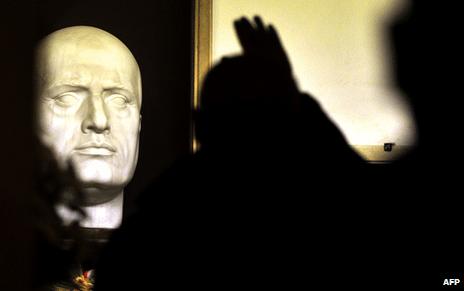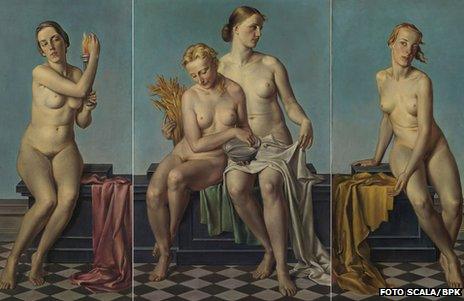Italy's mixed feelings about Fascism
- Published

Mussolini's tomb is still visited by admirers
The ghost of Benito Mussolini, Italy's 20th Century Fascist dictator and Duce, dead and gone now for almost 70 years, is still stalking the country's politics.
Former Prime Minister Silvio Berlusconi, who is actively campaigning for re-election in next month's general election, set off a chorus of outrage this week.
He suggested, while attending a Holocaust Memorial Day ceremony in Milan, that the Duce had not been as entirely bad as the history books made out. In fact he had done some "good things".
Mr Berlusconi said that the racial laws, which led to 8,000 Italian Jews being herded off to death camps, were Mussolini's "worst mistake".
Mr Berlusconi was even rebuked by Italy's head of state, President Giorgio Napolitano, who said that democratic Italy knew that Fascism was an "aberration".
The canny media magnate was immediately accused of courting extreme right-wing support for his proposed new People of Freedom party coalition in the run-up to the election on 24-25 February.
He later backtracked, but his tactless remarks - and his even more tactless conduct in dozing off during part of the ceremony - recalled another occasion a decade ago when he appeared to praise Mussolini by claiming that the Fascist dictator had "never killed anybody".
Enduring cult
Mr Berlusconi made his comments to TV crews in Milan on Holocaust Memorial Day, as Wendy Urquhart reports.
In Germany de-Nazification was actively and officially pursued for years after the end of World War II. Chancellor Angel Merkel said this week that Germany's responsibility for the Holocaust was "everlasting". But in Italy, Fascism was never rooted out with the same enthusiasm.
True, the new Italian republic which succeeded two decades of Fascist rule made it a crime to attempt to revive Mussolini's Fascist party.
But for decades after the war, the right-wing MSI (Italian Social Movement) led by Giorgio Almirante was represented in parliament and managed to keep alive many Fascist ideals while avoiding prosecution under this law. "If being a gentleman means that I am a Fascist," he once told the BBC, "then I am a Fascist."
The distinguished Italian historian of Fascism Emilio Gentile has written that Mussolini raised his political ideology to the status of a religious cult.
Mussolini's grand-daughter Alessandra is still active in politics. She founded a right-wing movement of her own and latterly has been supporting Mr Berlusconi's Freedom Party coalition.
Shouting, she stalked out of a TV political debate this week because a leftist journalist had, in her opinion, insulted the memory of her grandfather.
Nazi favourite

The Four Elements, by Adolf Ziegler, was on display in Florence
Italy's political ambivalence over its Fascist heritage has been mirrored in the arts.
The 1920s and 1930s were a period of considerable artistic and architectural endeavour and achievement, encouraged by the Mussolini regime, but political taboos have tended to hinder serious attempts to re-examine the art of the Fascist periods - until now.
This winter, an exhibition at the Palazzo Strozzi in Florence of paintings and sculpture from the 1930s entitled The Arts in Italy Beyond Fascism, external has attracted large numbers of visitors.
Apart from works of important Italian painters of the period who also circulated in Paris and Berlin, the exhibition included a large composite of four monumental nudes by Hitler's favourite artist, Adolf Ziegler. This was one of the most reproduced works of modern art in Nazi Germany.
The curators of the Palazzo Strozzi exhibition - under the direction of a Canadian art historian who heads the museum - invited visitors to "explore the decade without prejudice", breaking political and intellectual taboos which have endured since Mussolini's ignominious end in Milan in 1945.
- Published27 January 2013
- Published28 January 2013
- Published15 August 2012
- Published15 July 2012